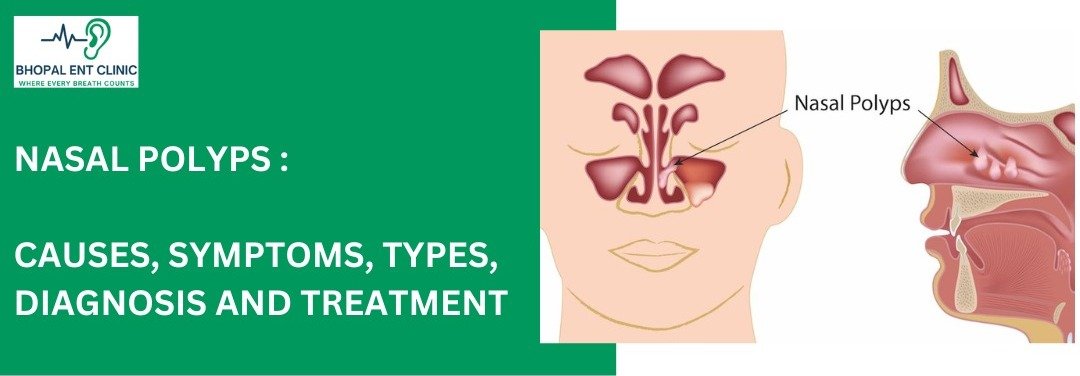Nasal Polyps
Breathing becomes easy again with effective treatment of nasal polyps at Bhopal ENT Clinic

Nasal polyps are benign growths that form in the lining of the nasal passages and sinuses. These growths are typically soft and painless, but they can cause discomfort and affect your ability to breathe properly. Nasal polyps can vary in size, and larger ones may block the nasal passages, leading to breathing difficulties, a reduced sense of smell, and frequent sinus infections.
Symptoms of the Nasal Polyps
The symptoms of nasal polyps may include:
- Persistent stuffiness or congestion
- Sense of smell and taste is reduced or lost.
- Postnasal drip
- Facial pain or pressure
- Snoring
- Frequent sinus infections
- Itchy eyes and constant tearing
Breathe freely once again The Bhopal ENT Clinic provides relief from nasal polyps.
Are you experiencing persistent nasal congestion, difficulty breathing, or a loss of smell? These may be symptoms of nasal polyps, a common condition that affects many individuals. Nasal polyps are non-cancerous growths on the lining of the nasal passages or sinuses, which can cause discomfort and affect your quality of life.
At Bhopal ENT Clinic, we understand the impact that nasal polyps can have on your daily activities and overall health. That’s why we offer comprehensive Nasal Polyps treatment in Bhopal, provided by Dr. Shalini Jadia, an experienced ENT specialist in Bhopal.
Our Strategy for Treating Nasal Polyps
Accurate Diagnosis
ENT specialist Dr. Sadat Qureshi starts by thoroughly evaluating your symptoms and medical history. We may perform nasal endoscopy or imaging tests to confirm the presence and extent of nasal polyps.
Individualized Treatment Plans
Every patient is unique, and we believe in tailoring our treatment approach to individual needs. Depending on the size and severity of your nasal polyps, we may recommend a combination of medication and minimally invasive procedures.
Medication
In many cases, nasal polyps can be effectively managed with nasal corticosteroids or oral corticosteroids to reduce inflammation and shrink the polyps. These medicines can help reduce symptoms such as blocked noses and nasal discharge.
Minimally invasive procedures
For large or persistent nasal polyps, our ENT specialists may recommend minimally invasive procedures such as endoscopic sinus surgery (ESS). ESS allows precise removal of polyps while preserving surrounding healthy tissue, resulting in improved nasal breathing and relief of symptoms.
Follow-up Care
Your journey toward relief from nasal polyps does not end after treatment. We provide comprehensive follow-up care to monitor your progress, adjust treatment as needed, and ensure long-term symptom management.
Dr. Sadat Qureshi of the Bhopal ENT Clinic provides expert care for nasal polyps
Experienced ENT Specialist
Dr. Sadat Qureshi, an ENT Specialist in Bhopal, has extensive experience in the diagnosis and treatment of nasal polyps, ensuring that you receive the highest standard of care.
State-of-the-Art Facilities
We are equipped with advanced diagnostic equipment and technology to accurately diagnose and effectively treat nasal polyps, providing you with optimal results.
Compassionate Care
We understand the impact of nasal polyps on your quality of life, and we are committed to providing compassionate care and support throughout your treatment journey.
Schedule Your Appointment Today!
Don’t let nasal polyps interfere with your daily life. Take the first step towards relief by scheduling a consultation with ENT specialist Dr. Saadat Qureshi in Bhopal. Contact us today to book an appointment and take control of your nasal health.
FAQs
Nasal polyps are benign growths that develop in the lining of the nasal passageways, or sinuses. They are often teardrop-shaped and vary in size. These growths are usually associated with inflammation of the nasal mucosa.
Common symptoms of nasal polyps include nasal congestion, reduced sense of smell or taste, postnasal drip, facial pain or pressure, snoring, and frequent sinus infections. In some cases, nasal polyps may also cause headaches and a runny nose.
While it’s not always possible to prevent nasal polyps, certain measures may help reduce the risk of their development or recurrence. These include managing conditions such as allergies and asthma, avoiding triggers that exacerbate nasal inflammation (such as cigarette smoke and environmental pollutants), and practicing good nasal hygiene, such as using saline nasal sprays or rinses.
Treatment for nasal polyps depends on the severity of symptoms and may include medications such as corticosteroids (nasal sprays or oral), antihistamines, or antibiotics to reduce inflammation and control infections. In some cases, surgical removal of the polyps may be necessary, especially if they are large or causing significant symptoms.
Yes, nasal polyps can recur even after treatment. Managing underlying conditions and following a maintenance plan recommended by your healthcare provider can help reduce the risk of recurrence.


